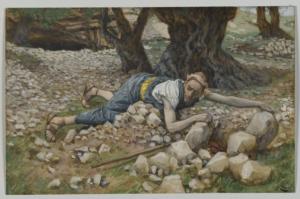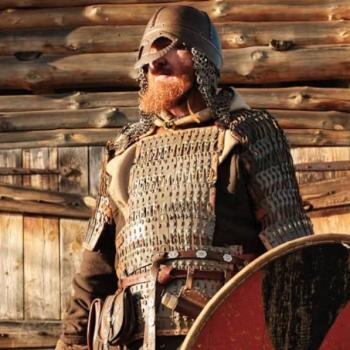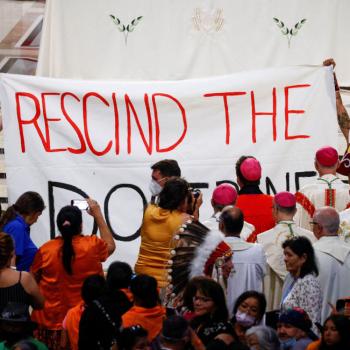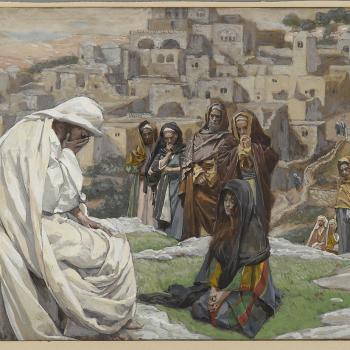
For some time I’ve been working with the conviction that many, if not most, of Jesus’ parables are not what tradition, as I first learned it, has made of them. Jesus did not code heavenly meanings in earthy stories that his peasant listeners could relate to most easily. It was an entirely different kind of coding – of dangerous thoughts that poor subjects of an oppressive system would have loved to say openly but didn’t dare. Oppressed peoples are often in this situation.
This is the eighth post on William R. Herzog II’s Jesus, Justice and the Reign of God. Earlier posts in the series are:
- The Historical Jesus and the Transcendent God in the Work of William Herzog
- Context Group Continues the Long History of Witnessing to Jesus
- Jesus Heals a Paralytic and Opens a Temple-Free Zone of Grace
- The Temple, Jesus, and the Little Traditions of Village Life
- A Rich Man Follows All the Old Rules. Or Does He?
- The Tradition of the Elders or the Mercy of God
- Jesus Reinterprets the Sabbath and Subverts the Social Order
On stage and off stage: dangerous thoughts in an oppressive time
Herzog describes a kind of dissembling that oppressed people practice. When they are “on stage,” in public, they “act and speak as loyal and obedient subjects who consent to the rule of the elites.” “Off stage,” in private with people they trust, they speak their dangerous thoughts. In Herzog’s words, “[T]hey speak the hidden transcript of their opposition and resistance to the exploitation…. [And they] analyze their situation more truthfully.” (p. 194)
Herzog discusses three of Jesus’ parables. All of them feature the land, a factor of utmost concern in the lives of villagers. The land was God’s gift to all the people equally – at least in the beginning. Villagers knew the story that told how Joshua divided the Promised Land among the tribes according to their sizes. But this traditional view of the land was losing ground to another view. For Roman conquerors, Herodian client rulers, and temple and landholding elite, land was a commodity. (p. 192) Land was an opportunity for economic gain through taxes, rents, fees, and interest on peasants’ debt. Appearing on the threshing floor at harvest time, they would “devour and choke the peasant’s harvest, leaving barely enough for subsistence….” (p. 194-995)
This is the situation – both the original status of land as gift and its perversion into commodity for exploit – that Jesus encodes in three “on stage” parables. The parables of the Sower, the Seed Growing Secretly, and the Treasure Hidden in the Field hide some very dangerous thoughts.
The Parable of the Sower (Mark 4:3-9, summarized) and two earlier interpretations
A farmer is sowing seed. Some falls on the path, some on rocky ground, and some among thorns. In each of these three cases the seed meets a violent end. Birds come and eat it up, or the sun scorches it because it has no root, or thorns choke it. But some seed falls on good soil and it grows and yields thirty, sixty, and a hundredfold. Jesus ends the parable: “Let anyone with ears to hear listen.”
In a traditional interpretation, starting with the Gospel itself, all of the seed represents people who hear Jesus’ “word.” But they hear it in different ways. Only the ones on good soil hear and accept the word and bear fruit. Still, as a result the Kingdom of God, the Church, grows thirty, sixty, and a hundredfold.
In an earlier post I followed another interpretation by Ched Myers’ in Binding the Strong Man. He rejects the Kingdom of God interpretation but still focuses on the abundant harvest. For Myers the seed doesn’t represent anything except seed. With that superabundant harvest the farmer is able to get himself out of debt and buy back land he lost through foreclosure. Myers sees the parable as giving hope for a kingdom on earth where debt slavery will end forever. (Myers, p. 177)
Herzog’s more realistic interpretation
Myers is on the right track in locating the meaning of the parable in the everyday life of a farming community. But Herzog pays attention to some strange sayings that follow the parable in Mark’s Gospel. Jesus says the purpose of the parables is so that “they” may “listen but not understand; so that they may not turn again and be forgiven.” (4:12) I don’t think the Church has ever figured out why Jesus would not want his adversaries to turn, to correct their thinking, and amend their ways. But listening and not understanding is clear enough, Herzog says. It names the pattern of village speech that needs to keep dangerous thoughts hidden from the people’s oppressors, “they” in Jesus’ strange saying.
But what is hiding and where in the parable is it hiding? Herzog focuses intensely on the first part of the parable with its three violent verbs — “eat … scorch … choke” — that tell what happens to some of the seed. The violence of oppressors is an everyday reality for villagers. Being accustomed to messages in code, they have “ears to hear.” They will easily see their own situation reflected in what happens to the seed’s violent fate. It’s hardly likely that they would see, in the different fates of the seed, problems facing Jesus’ Kingdom or its ultimate success. Why would Jesus tell a parable with such an obscure meaning only to give a completely unexpected explanation? It’s much more likely – and a common scholarly view – that this artificial interpretation is the creation of Mark or his community, when the “kingdom” is, in fact, growing.
Land and temple
The last scene of the parable, with seed growing abundantly, also has a natural interpretation that those with “ears to hear” could easily understand. Jesus uses hyperbole to stress the generous nature of God’s gift of the land. “It produces thirty, sixty, and a hundred times more than the peasants need to survive.” And why aren’t the village farmers benefitting from this generosity of the land? The answer is not in any defect in the land itself. Rather, it’s “already portrayed in coded … form in the opening scene of the parable.” The people’s greedy oppressors “devour the peasants’ crops and choke their efforts to make ends meet.” (Herzog, p. 195)
The ideology of the rich says tithes and taxes that peasants should pay to the temple would procure God’s blessing on the land. It blames peasants’ desperate situation on their failure to fulfill their Torah obligations. But—here’s one of the dangerous thoughts—in this parable the temple is completely irrelevant. There’s no hint that blessing on the land depends on the temple or anything other than God’s original gift of the land.
The next two parables even more clearly separate peasants’ real needs from temple obligations.
The Parable of the Seed Growing Secretly (Mark 4:26-29)
The kingdom of God is as if someone would scatter seed on the ground, and would sleep and rise night and day, and the seed would sprout and grow, he does not know how. The earth produces of itself, first the stalk, then the head, then the full grain in the head. But when the grain is ripe, at once he goes in with his sickle, because the harvest has come.
If the land “produces of itself,” Herzog interprets, it doesn’t need any other blessing than what God’s original gift entails. I would emphasize also the previous verse, where the farmer “does not know how” the seed sprouts and grows. One group did claim to know how the land produced its fruit. It comes about through God’s blessing, which, in their way of thinking, only the temple procures. When Jesus says no one knows, he implies that the ones who think they know are both deceived and busy deceiving others.
Once again a traditional interpretation makes a parable that Jesus spoke to first-century peasants into something far from peasant minds: Have patience. The earth produces by itself. Just so, the kingdom of God will inevitably “come to full fruition.” That’s in the words of The New Annotated Oxford Bible. (p. 1799) But peasant ears hear instead the coded message about God’s gift and justice denied.
The Parable of the Treasure Hidden in the Field (Matthew 13:44)
The kingdom of heaven is like treasure hidden in a field, which someone found and hid; then in his joy he goes and sells all that he has and buys that field.
A short parable, but what a large array of interpretations it has received! None of them finds parable’s meaning in an actual field or actual seed. No dangerous thoughts here, and no reason for speaking in parables.
I found perhaps the most common interpretation in the Anchor Bible series of commentaries. The book on Matthew (p. 170) says the parable is about Jesus’ search for people for his Kingdom. There’s a price to pay, like the price of that field. Membership in the Kingdom demands sacrifice. The treasure is hiding, like the secret the disciples already possess—“the identity of the Messiah and his impending reign.” This could be an early Church interpretation, but not likely what Jesus meant to say, assuming he wanted anyone to understand him.
Herzog mentions other attempts at interpreting. A man’s existence is “rudely but happily shattered.” His future now is “as absolute in its call as it is unspecified in its detail.” (p. 198, quoting John Dominic Crossan) Crossan leans existentialist here. Overwhelming joy at the “inbreaking of the reign of God” is what Joachim Jeremias finds in the parable. Bernard Scott thinks it’s about grace but also “potential corruption.” Was it moral for the man to rebury the treasure and buy the field from its unsuspecting owner?
I don’t hear any dangerous thoughts in these interpreters, not for Jesus and his listeners. Herzog hears the parable as Jesus’ listeners could have heard it. They would have discerned some real dangers. For them seed and land were all-important. They would hardly be inclined to imagine something else that Jesus might be hinting at without saying what.
The field as treasure, and a dangerous thought
If you found a treasure in a field, why not put it in your pocket and walk away? That’s not an option for Jesus’ story because every peasant knows the field itself is a treasure. It’s not just what you can get out of the field – except for rich landowners, who look at a field and see dollar signs. A field is treasured truly as God’s gift and a family heritage. Herzog says that “the association of field and treasure would not be lost on Jesus’ peasant audience.” (p. 198)
In a normal year a field will produce more than enough for survival. But peasants reap almost none of this abundance. The ruling elite dispossess farmers from all that their lands’ yield except the barest minimum for survival. When opportunity strikes, they confiscate the land itself.
The surprise of the parable is the great reversal, in which a peasant buys back the field. that’s a dangerous thought that would never happen, of course. But Jesus’ “coyotelike character … reburies the treasure and buys the field, cheating the owner of his treasure.” A peasant audience would enjoy that. The parable doesn’t pretend to be economically realistic. It encodes a vision of God’s reign, in which those who “discern the hidden treasure of the land will one day possess” it. (p. 198-99) I think Herzog could have added that the parable affirms the small, “coyotelike” tactics of peasants. Poor people are adept at ways to make existence in an oppressive system a little more tolerable. That might even include hiding some of their fields’ produce from the taxman and the landlord.
Eventually the dangerous thoughts Jesus acted out and encoded in parables caught up with him. Why else would the Romans execute him?












